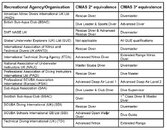DevonDiver
N/A
As others have said, most agencies; including PADI and BSAC, have direct equivalencies at their certification levels.
I took advantage of this myself, when I was a novice diver, switching back-and-forth between BSAC and PADI. I primarily dove BSAC through military dive clubs in the UK, but did PADI certifications 'out-of-interest' when on holiday. I never had any problem getting either brand of certification card accepted anywhere, anytime.
My progress was something like: BSAC Club Diver - PADI Open Water - PADI AOW - BSAC Sports Diver - BSAC Practical Rescue Management - PADI Rescue - PADI Nitrox - PADI Drift Diver - PADI Drysuit Diver - PADI Deep Diver - PADI Divemaster - BSAC Open Water Instructor - PADI OWSI - PADI MSDT - PADI Tech Deep Instructor - SSI OWSI - ANDI Technical Instructor (CSU/TWD/Sidemount) - PADI Sidemount/Tec Sidemount...etc etc
You could stay with BSAC right up to instructor level, then switch to PADI if you wanted. Everyone who wants to be a PADI instructor has to do the IDC (Instructor Development Course) and IE (Instructor Exam). So the highest equivalent that can be accepted is at PADI Assistant Instructor (AI) - BSAC Instructor levels. i.e. if you are a BSAC Club instructor (or higher) you can attend direct on a PADI IDC (and miss out the AI course, but that is not recommended really).
BSAC Advanced Diver & First Class Diver have no direct equivalencies in PADI; who have no advanced-level recreational diving grades.
One of the key things with BSAC is finding an active, inclusive club to join. Clubs vary greatly and are personality driven. The better clubs are very active in promoting continual development in their members (they run frequent, progressive courses), have regular dive trips and club expeditions/holidays. The worst clubs are stagnant and cliquey.
PADI training is also incredibly variable in quality. What you get from a given course is entirely dependent on the instructor concerned. The industry is rife with 'bare minimum' providers; who do nothing more than work through a check-list of skills standards and pay little heed to your actual performance or needs as a student. You need to do some research on potential instructors; search for the best... and look for genuine expertise and specialism in specialty activities.
See my article on progressive scuba training, for hints and tips on selecting courses/instructors: The Value of Progressive Scuba Training | 'Putting Another Dollar In'
...and this one specifically on wreck diving courses: How To Evaluate A Wreck Diving Course
---------- Post added December 18th, 2013 at 10:25 AM ----------
Some of the information given on that link isn't accurate...
I took advantage of this myself, when I was a novice diver, switching back-and-forth between BSAC and PADI. I primarily dove BSAC through military dive clubs in the UK, but did PADI certifications 'out-of-interest' when on holiday. I never had any problem getting either brand of certification card accepted anywhere, anytime.
My progress was something like: BSAC Club Diver - PADI Open Water - PADI AOW - BSAC Sports Diver - BSAC Practical Rescue Management - PADI Rescue - PADI Nitrox - PADI Drift Diver - PADI Drysuit Diver - PADI Deep Diver - PADI Divemaster - BSAC Open Water Instructor - PADI OWSI - PADI MSDT - PADI Tech Deep Instructor - SSI OWSI - ANDI Technical Instructor (CSU/TWD/Sidemount) - PADI Sidemount/Tec Sidemount...etc etc
You could stay with BSAC right up to instructor level, then switch to PADI if you wanted. Everyone who wants to be a PADI instructor has to do the IDC (Instructor Development Course) and IE (Instructor Exam). So the highest equivalent that can be accepted is at PADI Assistant Instructor (AI) - BSAC Instructor levels. i.e. if you are a BSAC Club instructor (or higher) you can attend direct on a PADI IDC (and miss out the AI course, but that is not recommended really).
- BSAC Ocean Diver can enroll directly onto PADI AOW
- BSAC Sports Diver can enroll directly onto PADI Rescue
- BSAC Rescue Diver + Practical Rescue Management SDC + First Aid/CPR qualification can enroll directly onto PADI Divemaster
- BSAC Dive Leader can enroll directly onto PADI Assistant Instructor
- BSAC Instructor (any level) can enroll directly onto PADI IDC
BSAC Advanced Diver & First Class Diver have no direct equivalencies in PADI; who have no advanced-level recreational diving grades.
One of the key things with BSAC is finding an active, inclusive club to join. Clubs vary greatly and are personality driven. The better clubs are very active in promoting continual development in their members (they run frequent, progressive courses), have regular dive trips and club expeditions/holidays. The worst clubs are stagnant and cliquey.
PADI training is also incredibly variable in quality. What you get from a given course is entirely dependent on the instructor concerned. The industry is rife with 'bare minimum' providers; who do nothing more than work through a check-list of skills standards and pay little heed to your actual performance or needs as a student. You need to do some research on potential instructors; search for the best... and look for genuine expertise and specialism in specialty activities.
See my article on progressive scuba training, for hints and tips on selecting courses/instructors: The Value of Progressive Scuba Training | 'Putting Another Dollar In'
...and this one specifically on wreck diving courses: How To Evaluate A Wreck Diving Course
---------- Post added December 18th, 2013 at 10:25 AM ----------
I would have to agree being both CMAS and PADI that CMAS training is WAY more indepth than PADI. Do a quick google of the certification equivalents and you will find your cross over may be a little higher than you think. Dive Agency Crossovers BSAC, CMAS, SSI, NAUI & SAA to PADI
Some of the information given on that link isn't accurate...





